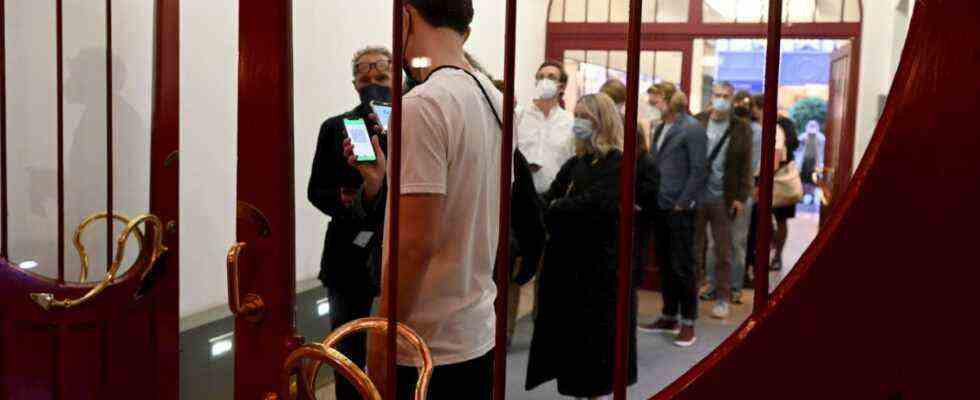For many Sicilians, Cateno De Luca is a hero. The mayor of Messina went on a public hunger strike at the port a week ago. He wanted to protest against the fact that only those who had been vaccinated or had recovered could reach or leave the Mediterranean island on ferries or planes. The state is holding Sicily captive, De Luca said. Whether you share his opinion or not, you can say: De Luca is committed to his island, he literally burns for this, his place of culture.
Or Boris Palmer. A year ago, Tübingen’s mayor created his own small, quite controversial cultural, gastronomic and shopping space for those who had been tested and campaigned for it on the talk shows (“It’s also possible in Munich”). Hardly any Bavarian mayors caused such a stir during the pandemic. Logically, they were burdened up to the point of enforcing the prescribed anti-virus measures with their authorities. In any case, there was little objection. Now, however, some mayors of larger and medium-sized Bavarian cities are critical of a weak point in the infection protection program. Munich Mayor Dieter Reiter, SPD, was the first to do so. Asked to do so by his own governing coalition of SPD/Volt and Green/Rosa List, he said: “I regret that the Bavarian state government has failed to end the unequal treatment of cultural institutions and gastronomy in relation to the Corona measures. It is also Given the increasing number of infections, it is incomprehensible why theatres, cinemas and other cultural institutions that have very good hygiene concepts are still subject to a strict 2-G-plus regulation (…)”
Würzburg Mayor Christian Schuchardt experienced the worsening of culture during a visit to the ballet
The mayor of Würzburg, Christian Schuchardt (CSU, FDP, Bürgerforum) has also had his own unpleasant experience with the worsening of culture: “I was in the ballet a week ago, two seats were free next to me, and I had to wear a mask the whole time. Why It’s not clear to me that the corona rules are stricter here than in restaurants, for example,” he said when asked by the SZ: “For me, the general conditions are almost the same for both, but different access rules apply. Culture is just as much a part of everyday life .” Schuchardt emphasizes that he was particularly committed to the arts during the difficult phase, for example around 400,000 euros more was spent on cultural work in 2022 compared to the last non-pandemic year 2019.
Culture is important to everyone, including, of course, the second and cultural mayor of Nuremberg, Julia Lehner, CSU. In her function as chairwoman of the Bavarian Theater Association, she also took part in the advisory round between cultural workers and five state ministers at the beginning of the year. Since the “cultural industry in all its facets” is still being subjected to a major stress test, and many people are plagued by fears for the future, she demanded there: “As far as the pandemic situation permits, adjustments to access restrictions in culture are undoubtedly urgently required in order to secure the existence of artists secure and guarantee the basic cultural needs of the people”. After many discussions, she was confident that “appropriate measures would be taken”. And Markus Söder has promised at least a doubling of the occupancy rate in theaters, cinemas and concert halls to 50 percent. However, Lehner does not risk a dispute with the catering trade and argues in the “extremely complex area of tension between health protection and social relaxation” like State Chancellery boss Florian Herrmann: “Industry comparisons are not very helpful in the debate, everyone is equally affected by the pandemic.”
Passau’s Lord Mayor Jürgen Duppner urges caution
Jürgen Dupper, SPD mayor of Passau, still attaches great importance to giving the cultural sector “positive signals” “that we stand behind it”, for example by unbureaucratically opening the cathedral square for the “Eulenspiegel’s Flying Circus” festival . But he also urges caution and does not explicitly demand equality with the Passau innkeepers: “As far as the Corona regulations are concerned, we of course comply with the applicable regulations. But if these are relaxed and lightened, we certainly have nothing against it .”
Gertrud Maltz-Schwarzfischer, SPD, is clear. In Regensburg, she is currently trying to curb the protest “walks” of the lateral thinker camp against the Corona measures. And she is aware that the number of infections is skyrocketing “in Regensburg, as well as in Munich, throughout southern Bavaria”. But she demands that the state government involve the town halls earlier in decisions that have to be implemented in the municipalities. And she, too, considers the unequal treatment of culture “extremely unfair”. Like her colleague Thomas Kiechle, CSU, from Kempten, who writes to the SZ: “I can understand the frustration of the cultural workers very well and share it. Nobody can explain why there are extremely strict access regulations for cultural events, while in other areas of the In public life, such as in gastronomy or retail, clearly relaxed regulations apply. This balancing act is difficult to represent.”

